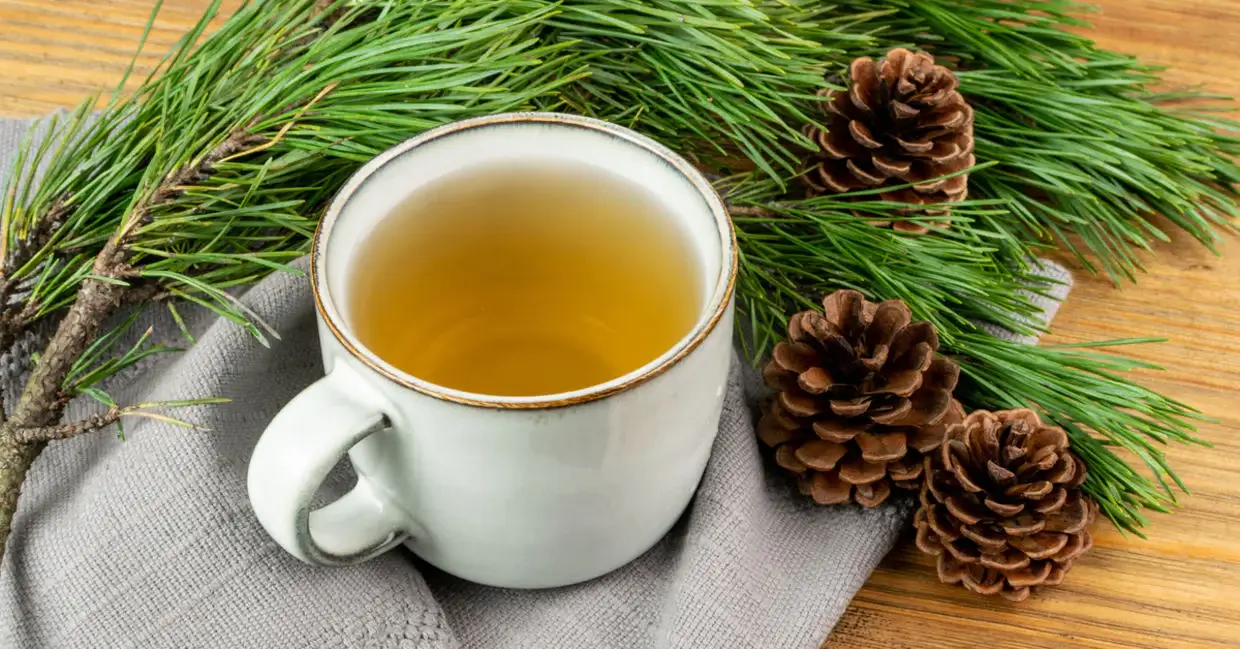I remember the first time I tried pine needle tea. It was during a hiking trip in the mountains, and our guide brewed a batch using fresh pine needles from the surrounding trees.
I was a little skeptical at first, but the moment I took a sip, I was pleasantly surprised by its distinct, earthy flavor and refreshing taste.
Since then, I’ve become intrigued by this unconventional herbal tea and its potential health benefits.
As someone who values natural remedies and holistic wellness, I couldn’t help but delve deeper into the world of pine needle tea and its impact on our well-being.
So, is pine needle tea good for you?
The short answer is a resounding yes! This unique beverage offers a wealth of health advantages that make it a valuable addition to any wellness routine.
Let’s explore the fascinating world of pine needle tea and why you should consider incorporating it into your daily life.
What is Pine Needle Tea?
Pine needle tea is an herbal infusion made from the fresh or dried needles of various pine tree species.
While the idea of brewing tea from tree needles might sound unconventional, this ancient practice has been a part of many cultures worldwide for centuries.
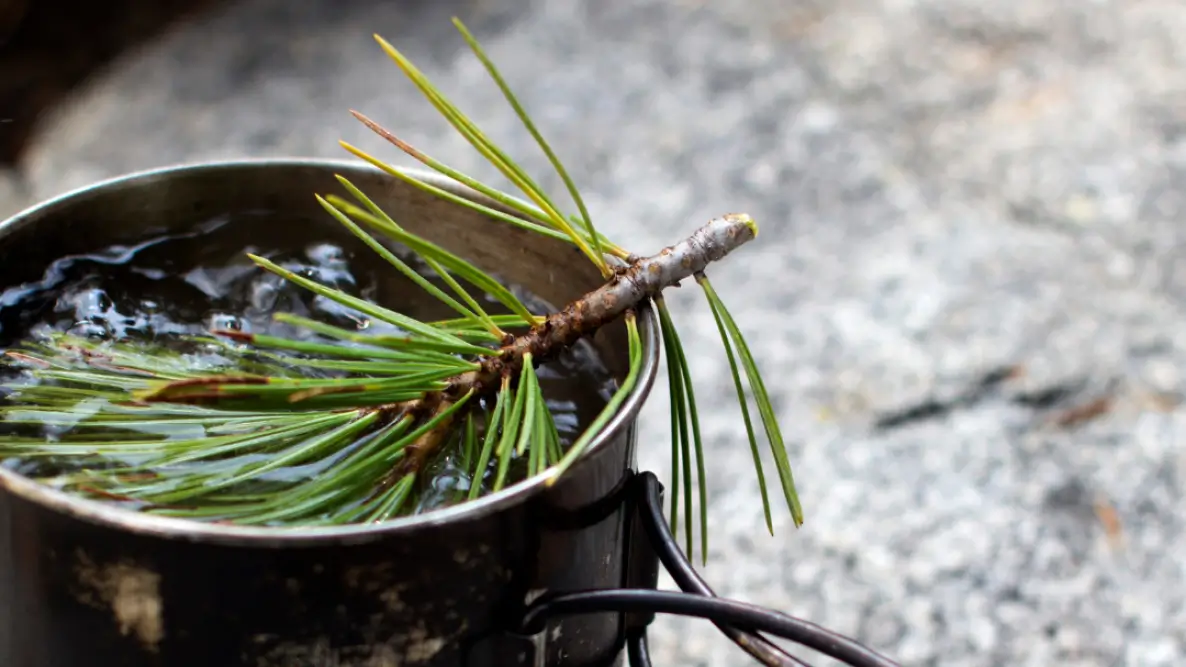
The Eastern White Pine (Pinus strobus) and Scotch Pine (Pinus sylvestris) are two of the most commonly used varieties for making pine needle tea.
These majestic trees are native to North America and Europe, respectively, and their needles are known for their distinct aroma and flavor.
To make pine needle tea, the fresh or dried needles are steeped in hot water, allowing their natural oils and compounds to infuse the liquid.
The resulting brew has a unique, earthy, and slightly citrusy taste that many find refreshing and invigorating.
Nutritional Profile and Key Compounds
One of the primary reasons why pine needle tea is considered so beneficial is its impressive nutritional profile.
These needles are packed with essential vitamins, minerals, and antioxidants that can contribute to overall health and well-being.
Vitamin C
Pine needle tea is an excellent source of vitamin C, containing up to four to five times more vitamin C than a glass of orange juice.
Vitamin C is a powerful antioxidant that supports immune function, promotes wound healing, and contributes to collagen production, which is essential for healthy skin, bones, and connective tissues.
Antioxidants
In addition to vitamin C, pine needles are rich in other potent antioxidants, such as alpha-pinene, beta-pinene, beta-phellandrene, D-limonene, germacrene D, 3-carene, and caryophyllene.
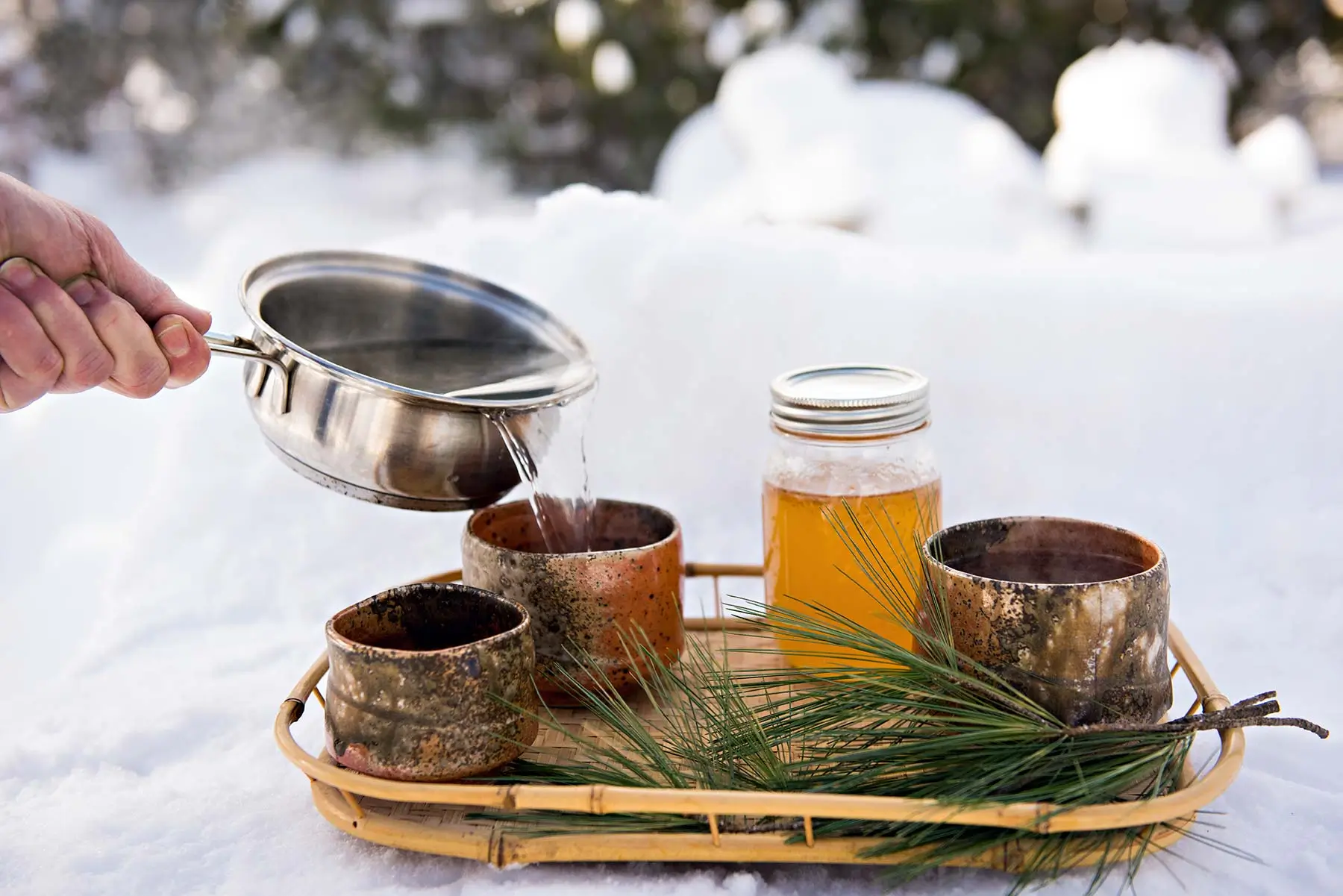
These compounds help neutralize harmful free radicals in the body, protecting cells from oxidative stress and reducing the risk of chronic diseases.
Vitamin A
Pine needle tea also contains significant amounts of vitamin A, which is essential for maintaining healthy vision, supporting immune function, and promoting cell growth and development.
Other beneficial compounds found in pine needles include terpenes, flavonoids, and phenolic acids, all of which contribute to the tea’s potential health benefits.
Health Benefits of Pine Needle Tea
Now that we’ve explored the nutritional profile of pine needle tea, let’s dive into the specific health benefits this remarkable beverage may offer:
Immune System Support
With its high concentration of vitamin C and antioxidants, pine needle tea is a fantastic choice for supporting a healthy immune system.
Vitamin C plays a crucial role in the proper functioning of various immune cells, helping the body fight off infections and illnesses more effectively.
Additionally, the antioxidants present in pine needles can help reduce inflammation, which is often a contributing factor in many chronic diseases and immune system disorders.
Respiratory Health
Pine needle tea has been traditionally used as a natural remedy for respiratory issues, such as colds, coughs, and bronchitis.
The tea’s expectorant properties can help loosen and expel mucus from the respiratory tract, providing relief from congestion and breathing difficulties.
Some studies have also suggested that the compounds found in pine needles may have anti-inflammatory effects on the respiratory system, potentially alleviating symptoms of conditions like asthma and allergies.
Skin Health
The antioxidants and vitamin C found in pine needle tea can benefit skin health in several ways.
Vitamin C is essential for collagen production, which helps maintain skin elasticity and reduce the appearance of fine lines and wrinkles.
Additionally, the tea’s anti-inflammatory properties may help soothe skin irritations and conditions like eczema or psoriasis.
Some people even use pine needle tea as a natural astringent or toner for their skincare routine.
Digestive Support
Pine needle tea has been traditionally used to aid digestion and alleviate various digestive issues.
The compounds present in the needles may help stimulate digestive enzymes, promoting better nutrient absorption and reducing discomfort associated with indigestion, bloating, and constipation.
Furthermore, the anti-inflammatory properties of pine needle tea can help soothe irritated or inflamed digestive tissues, providing relief from conditions like Crohn’s disease or ulcerative colitis.
Potential Anticancer Properties
While more research is needed in this area, some preliminary studies have explored the potential anticancer properties of compounds found in pine needles.
Certain terpenes and flavonoids present in the needles have shown promising results in inhibiting the growth and spread of various types of cancer cells in laboratory settings.
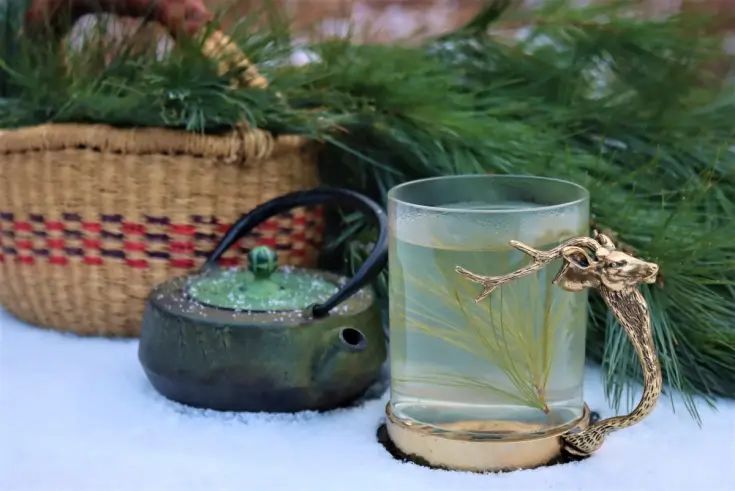
However, it’s important to note that these studies are still in the early stages, and more human trials are necessary to fully understand the potential anticancer effects of pine needle tea.
Weight Management
Some proponents of pine needle tea suggest that it may aid in weight management efforts.
The theory is that the compounds found in pine needles can help boost metabolism and increase feelings of fullness, potentially leading to reduced calorie intake and weight loss.
While more research is needed to confirm these claims, the tea’s high nutrient content and potential to support overall health and well-being may contribute to a well-rounded weight management approach.
Choosing Safe and Edible Pine Needles
Before you start incorporating pine needle tea into your routine, it’s crucial to understand that not all pine needles are safe for consumption.
Some pine species contain toxic compounds that can be harmful if ingested.
To ensure you’re using safe and edible pine needles, it’s recommended to stick with the following varieties:
- Eastern White Pine (Pinus strobus)
- Scotch Pine (Pinus sylvestris)
- Himalayan Cedar (Cedrus deodara)
- Japanese Red Pine (Pinus densiflora)
Avoid using needles from species such as Norfolk Island Pine, Australian Pine, or any other variety you’re unsure about.
It’s always better to err on the side of caution when it comes to foraging for edible plants.
Additionally, make sure to harvest needles from healthy, uncontaminated trees and avoid areas that may have been exposed to pesticides or other pollutants.
How to Prepare Pine Needle Tea
Preparing pine needle tea is a relatively simple process, but it’s important to follow the correct steps to ensure a safe and flavorful brew.
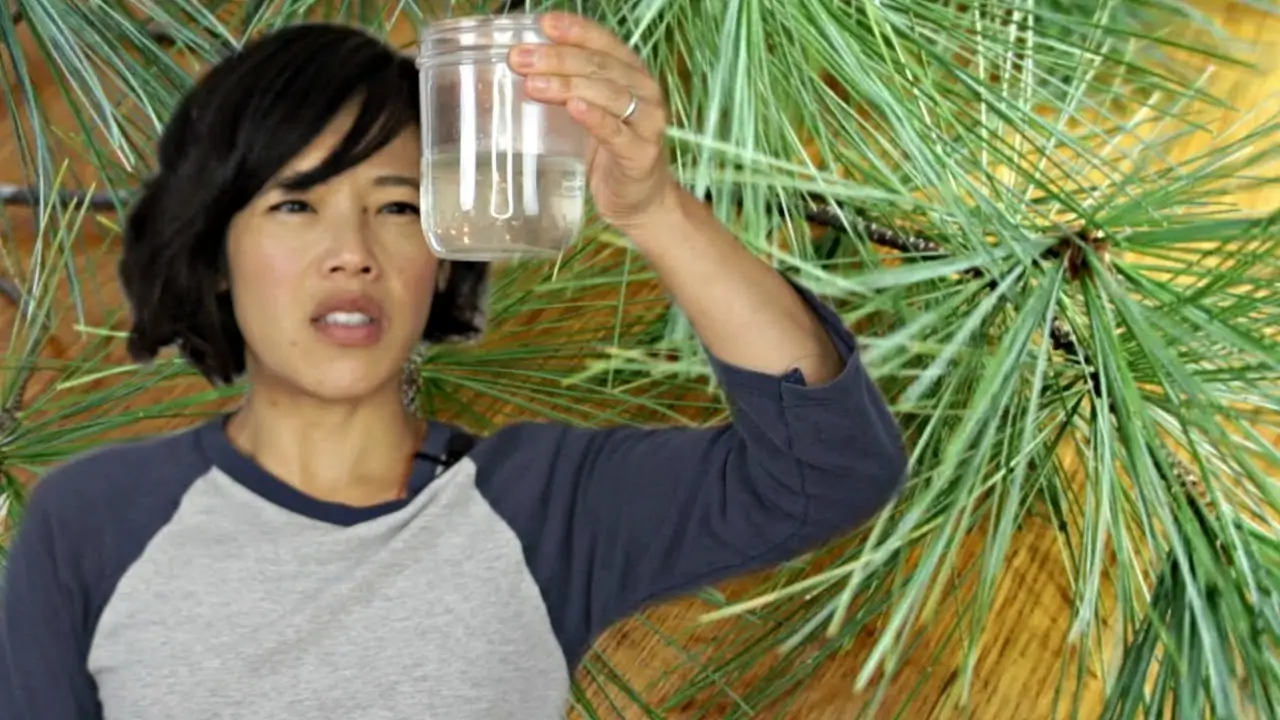
Here’s a basic guide:
Ingredients:
- Fresh or dried pine needles (from a safe species)
- Water
- Optional: Honey, lemon, or other desired flavorings
Instructions:
- Rinse the pine needles thoroughly under cool water to remove any debris or insects.
- If using fresh needles, remove any brown or discolored parts, as well as the sharp tips.
- Place the rinsed needles in a teapot or pot and cover with boiling water.
- Let the needles steep for 5-10 minutes, depending on your desired strength.
- Strain the tea into a cup or mug, discarding the used needles.
- Optionally, add honey, lemon, or other desired flavorings to taste.
It’s important to note that pine needle tea should be consumed in moderation, as excessive consumption could potentially lead to adverse effects.
Start with small amounts and monitor how your body reacts.
Incorporating Pine Needle Tea into Your Routine
Pine needle tea can be enjoyed hot or cold, making it a versatile beverage that can be incorporated into your daily routine in various ways:
- Morning Ritual: Start your day with a warm cup of pine needle tea for a refreshing and invigorating start.
- Afternoon Pick-Me-Up: Enjoy a hot or iced cup of pine needle tea as an afternoon pick-me-up, providing a boost of antioxidants and hydration.
- Post-Workout Beverage: After a challenging workout, sip on pine needle tea to replenish fluids and support muscle recovery with its anti-inflammatory properties.
- Digestive Aid: Drink a cup of pine needle tea after meals to aid digestion and support a healthy gut.
- Natural Cold Remedy: When you’re feeling under the weather, turn to pine needle tea for its immune-boosting and respiratory-supporting benefits.
Remember, pine needle tea should be consumed in moderation and as part of a well-rounded, balanced diet.
It’s always a good idea to consult with a healthcare professional, especially if you have any underlying health conditions or are taking medications.
Conclusion
Pine needle tea is a unique and nutritious herbal beverage that offers a wealth of potential health benefits.
From its impressive vitamin C content and antioxidant properties to its potential immune-boosting, respiratory-supporting, and anti-inflammatory effects, this ancient beverage is a true gem in the world of natural remedies.
By incorporating pine needle tea into your routine, you can enjoy a delightful and flavorful beverage while potentially supporting various aspects of your overall well-being.
Just remember to choose safe and edible pine species, prepare the tea properly, and consume it in moderation as part of a balanced lifestyle.

